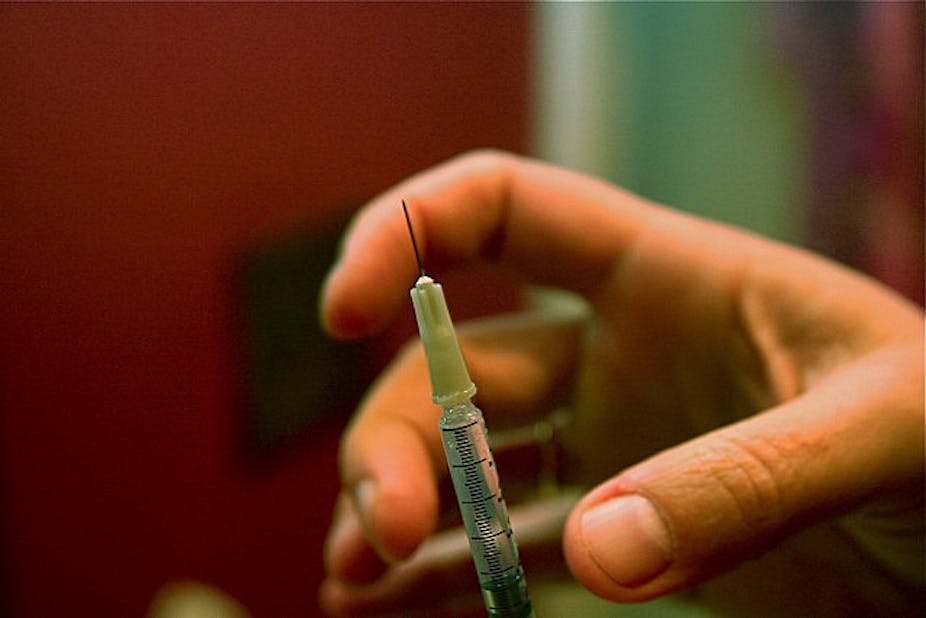A drug-addicted Melbourne anaesthetist has been accused of infecting 56 of his patients with hepatitis C by injecting himself with opiate-filled syringes, before using them on his patients. While his gross misconduct is clearly the cause of their infection, the fact that patients can potentially acquire blood-borne illnesses from health-care practitioners prompts us to ask whether patients have a right to know the infectious disease status of their health-care providers.
The professional expectation of physicians is best summarised by the phrase do no harm. But physician behaviour (misconduct or malpractice) can cause harm; so can a physician’s health status. And, of course, the matter is not restricted to physicians: the health-care workforce comprises many professionals including dentists, midwives, podiatrists, physiotherapists, paramedics and nurses.
Australian health-care workers who are impaired by drug addiction, alcohol abuse or dependency and mental disorders can be restricted from practise by their registration board. The assessment is based on their clinical competency and the desire to protect patient safety. But what about health-care workers (including students, trainees and volunteers) who are infected with serious viruses such as hepatitis B, hepatitis C, or HIV?
Reducing the risk of infection
It’s important to note that the overall risk of transmission of HIV from infected clinicians to their patients is very low: about 2.4 to 24 per million procedures. The risk of transmission of HIV from a patient to a clinician through mishaps such as needle-stick injuries is much higher, at around 0.3%. The risk of blood-borne virus transmission is dependent on a number of factors, including the individual’s level of viral load.
Health-care workers can help protect their patients from infection by obtaining the relevant immunisations, using infection control precautions (washing hands, wearing gloves and other personal protective gear) and monitoring their health status under the care of a personal physician.
Additionally, the Communicable Diseases Network Australia (CDNA) has issued guidelines that HIV positive health-care workers must not perform procedures where there is a risk of injury to the worker resulting in exposure of the patient’s open tissues to the blood of the worker. This includes inserting chest drains in patients with multiple rib fractures; deep suturing to stop hemorrhaging; repairs following gynaecological tears; and procedures involving the cutting or fixation of bones.
Clinicians mustn’t perform these risky procedures, even if their HIV virus levels become undetectable through anti-retroviral therapy. But they’re able still provide clinical care to patients.
Right to privacy
Some might argue that the community can only be protected from infected workers if they are informed about who they are. But should infected health-care workers be required to notify prospective patients of their viral status?
According to the Australian Medical Association and the Australian Dental Association, confidentiality is a key principle in managing the infected health-care worker. Confidentiality builds trust so that health-care workers feel assured in monitoring their health and seeking treatment without fear of punitive harm. This confidentiality principle is also foundational to the requirement that health-care workers notify their supervisor of their blood-borne viral infection if they are, have been, or are scheduled to perform exposure-prone procedures.
While health-care workers have the legal onus of confidentiality of their patients’ personal health information, there is no reciprocal confidentiality duty of patients and the community. If the viral status of a health-care worker were disclosed, this information could be used in discriminatory and other negative ways against the worker, including vilification.
Obligation to patients
If health-care workers discover they’re infected they have an ethical obligation to seek professional advice about their self-care, health monitoring and work limitations. Performing clinical activities outside of these limits when knowingly infected violates the ethical duties toward patients. It also sets the worker up for regulatory and employer disciplinary actions, as well as legal action from patients who experience harm.
A blood-borne viral infection need not end a health-care worker’s career; but neither should it end the life of a patient under his or her care. Health-care workers must do their part to ensure their patients are not in harm’s way.
Should health-care workers disclose their infectious disease status to patients? Share your comments below.

